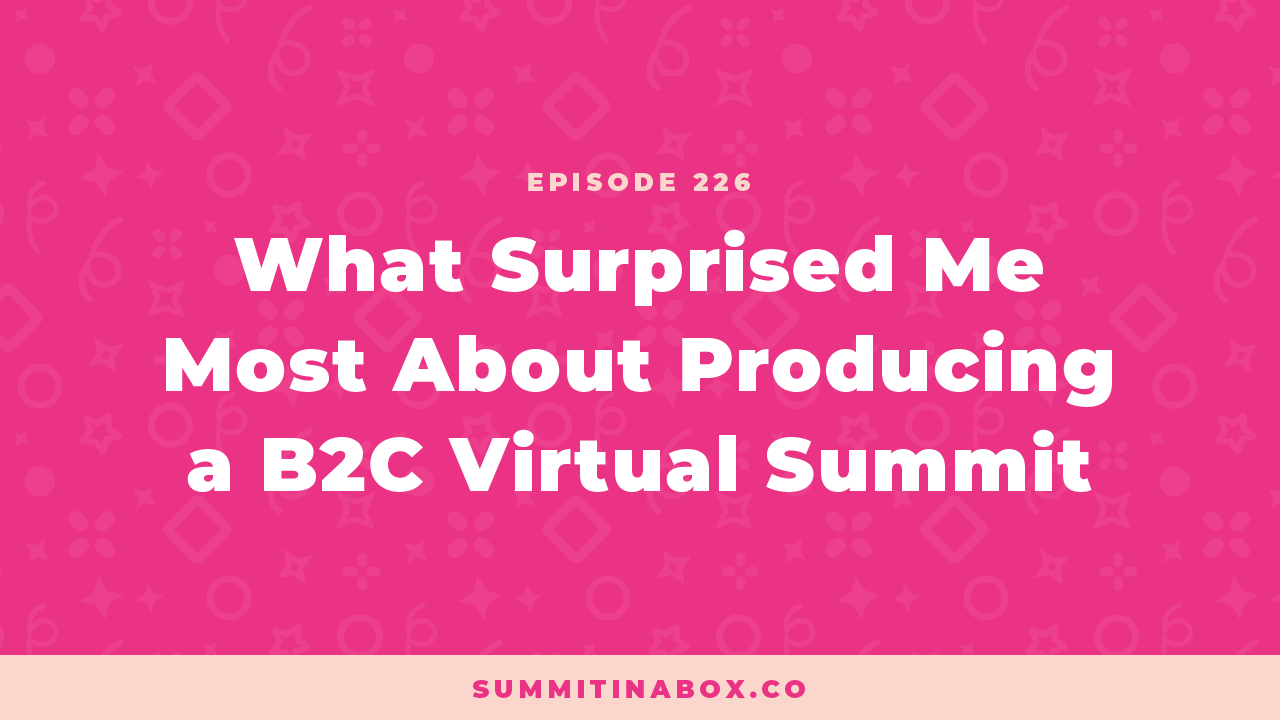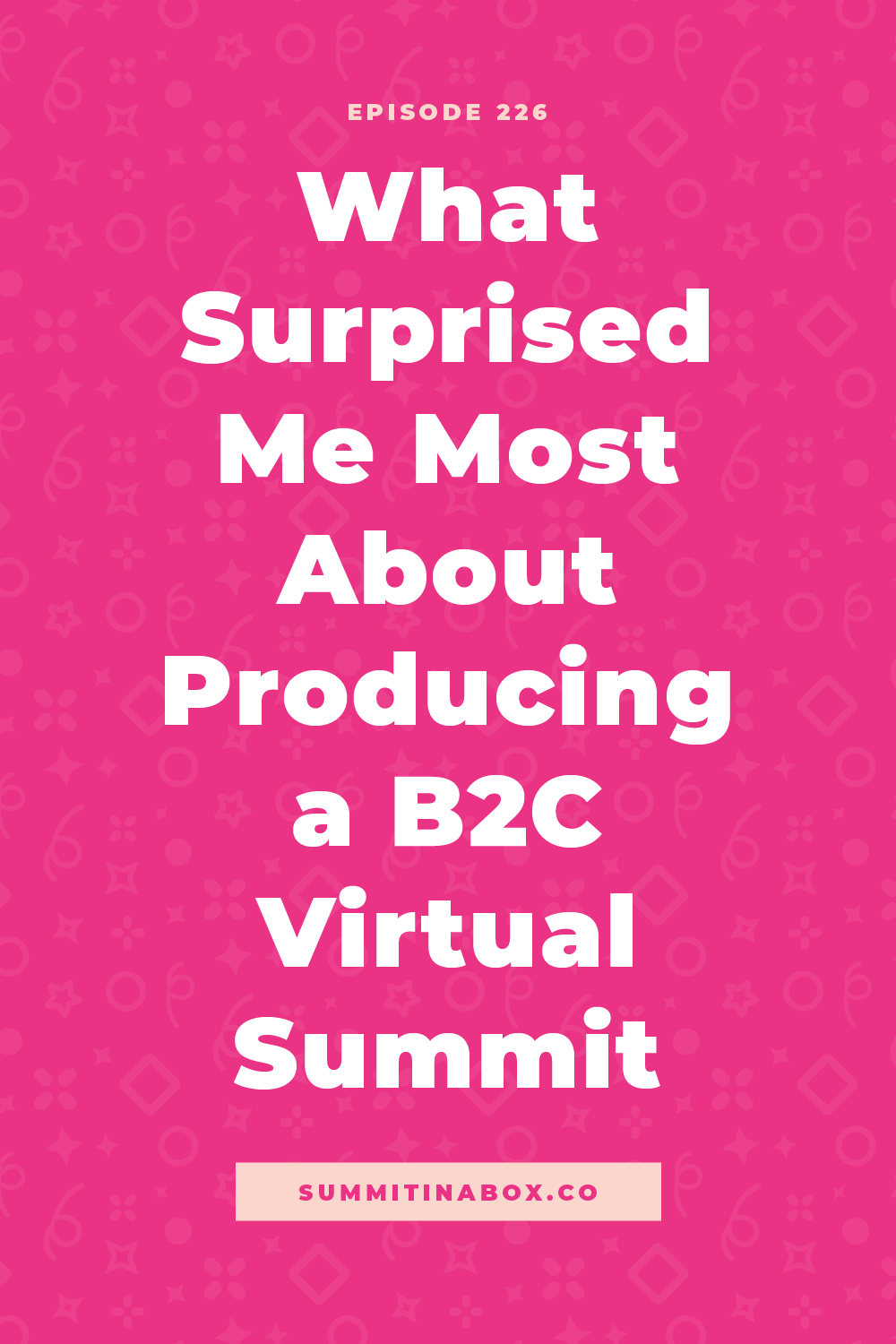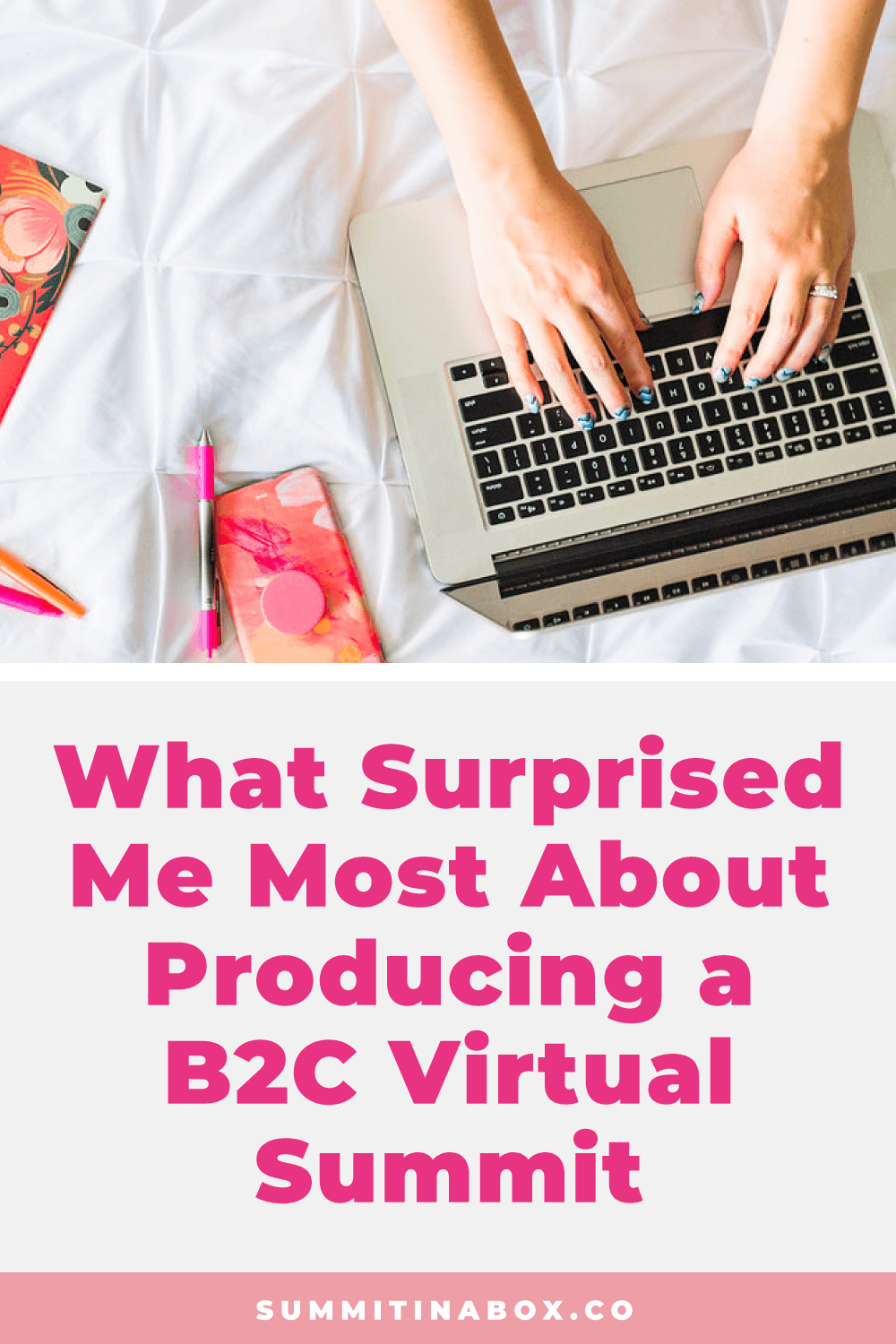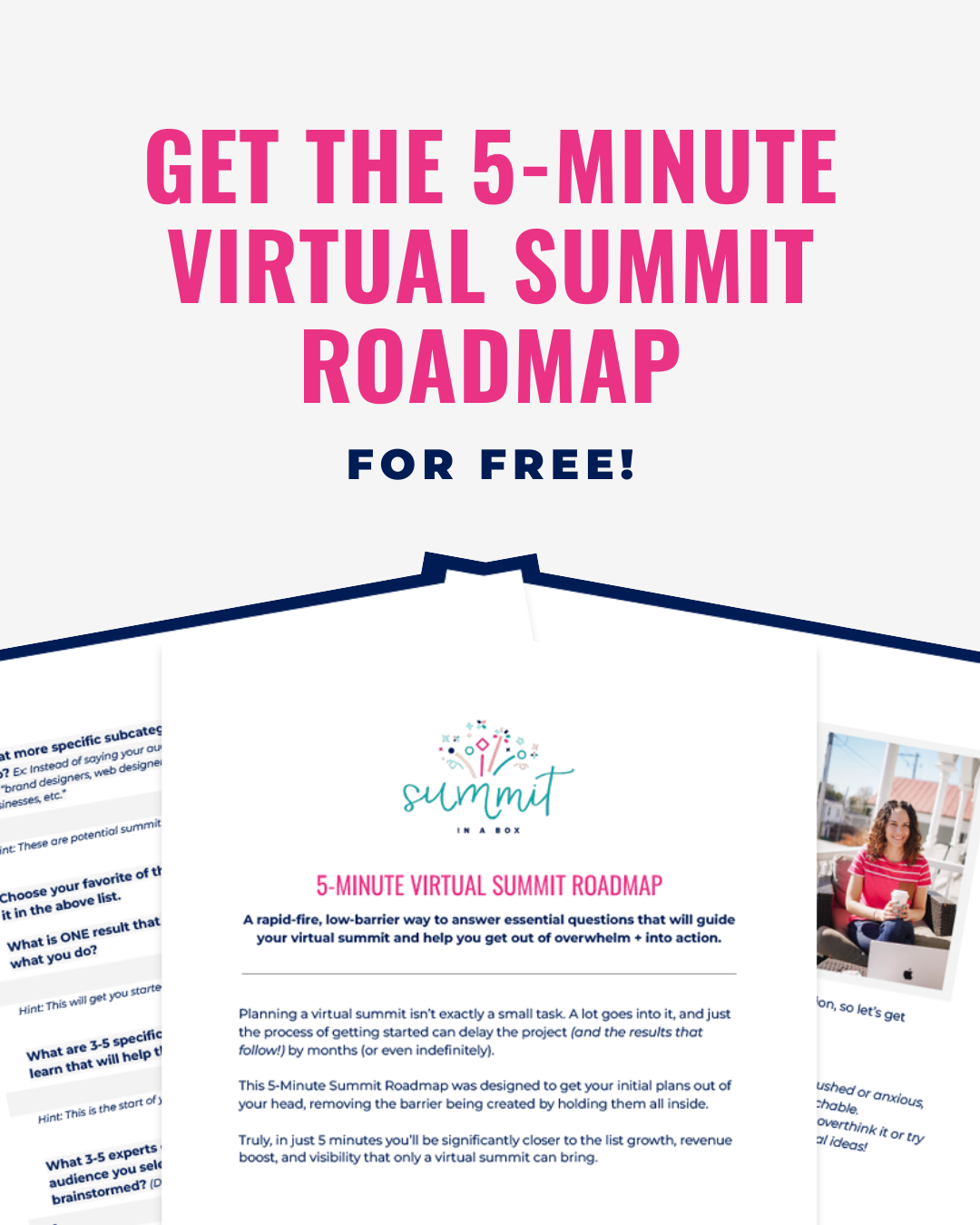What Surprised Me Most About Producing a B2C Virtual Summit


We are currently in a series where I'm sharing a behind-the-scenes look at the client summit we hosted back in January. If you're just tuning in and want a little more context behind this event, you might want to jump back to episode 223 where I gave an overview of what the event looked like.
In this series, we’ve also covered:
- Key Takeaways from Our Done-For-You Client Summit
- 7 Changes We've Made to Our Summit Strategy This Year
- The Truth About Launching a Membership Through a Summit
- Behind the Scenes of Offering Done-For-You Virtual Summit Production
Today, we're going to dive into what surprised my team and I most about producing a B2C (business to consumer) summit, including:
- how I thought the event would go, based on what I've heard B2C business owners say.
- what it was really like to host a summit for an audience that wasn't full of business owners.
- the key differences we noticed when comparing this summit to the summits for B2B audiences that we're used to.
By the end, those of you who target a consumer audience will know what to expect when going into hosting a summit and how it differs from anything you'll hear from someone hosting a summit for other business owners.
Listen to the episode
What I expected in my first B2C summit
Let's start with what I expected when hosting my first summit for a consumer audience.
To be honest, I really did expect there to be a big, groundbreaking difference that I finally discovered after all these years. In the past, I've heard people say that they doubted our strategies would work for them because marketing to a B2C audience is so different than B2B. I've seen people blame lackluster results on the fact that they don't market to other business owners.
And as someone who has always marketed a B2B audience, I just didn't have the experience to debunk any of those claims. I wanted to tell these people, “Our strategy works, you just have to do it right!” But I wasn't comfortable saying that because I didn’t have actual experience to back it up.
Based on that, I was really interested to see what we would come across.
What really happened...
Ready for the big breakthrough?
...
...
There was no groundbreaking difference. womp womp
Our summit hosting strategies worked and we didn't have to change a single thing in our core strategy and we saw incredible results:
- Attendees were engaged and bought the all-access pass.
- The client’s email list grew by over 10,000 people.
- They had a massive launch of their membership.
- They built great relationships with speakers who they'd never met before.
All the things that you want to happen in a summit, happened - despite the B2C audience.
Wondering how that's possible?
To break it down, let's look at two of the biggest myths I've had people claim about summits for a consumer audience.
And keep in mind, for the most part, I'm addressing people who have these doubts who either haven't hosted a summit or have hosted a summit with something not quite right in their strategy.
Myth #1: You can’t talk to a B2C audience like you can a B2B audience
First, I've had people say things like, "This won't work because you can't talk to (or sell to) a B2C audience like you can to business owners. You aren't teaching them to make money!"
My answer to that is (in the most loving way) is...yeaaahhhhh??? No matter who your audience is, you will always need to adjust your messaging to call out the transformation they're looking for.
Whether you're marketing to businesses or consumers, HAVE to speak to their desires, what they're struggling with, and the transformation they want.
There are B2B businesses that solve problems around generating revenue, bringing in leads, creating processes, handling clients, taking photos, creating websites, and more. Each of these requires a different marketing message and a different approach.
The same goes for B2C audiences who talk about things like homesteading, crafting, being a parent, working your way up the corporate ladder, etc. All of those also require a different marketing message.
The "problem" of needing specific messaging is not unique to B2C business owners, and it doesn't break anything about this strategy.
In fact, if you see B2B summits that all sound the same, they probably aren't getting great results!
Your unique marketing message is why it works. So, if you're someone who has seen your B2C audience as a limitation up until now, I think it's a really big strength and benefit you have- look at it that way instead!
Myth #2: B2C Audiences don’t want to spend money
Next up, I hear all the time about how specific audiences "don't want to spend money".
This argument always frustrates me, but I know it is newer business owners saying this and I totally remember how hard it is to figure out what you should sell and what you need to say to sell it.
I had a successful service-based business before I started Summit in a Box, but it took me a good 4 before I landed on the offer that eventually felt right and took off. Finding what people are willing to spend money on can be hard.
But the claim that a B2C audience won't spend money is straight-up, not true.
Our most successful clients and students and the ones who blow anyone's expectations out of the water with 25% all-access pass conversion rates, have all been B2C summit hosts with audiences that you would expect to not be “willing to spend money”.
But also, if you're sitting here thinking: “No, it's true for my audience, they will not spend money!” My question for you is: Why are you marketing to them? Why are you marketing to an audience if they truly will not spend money? Let's dig a little deeper and see if there's something we can change about the way you're approaching them and what you're trying to sell.
Myth #3: You have to charge peanuts for an all-access pass and can't make much money
The final myth I want to break down here is the claim that goes something like, "I can't make money through an all-access pass because I can't charge prices as high as you can for a B2B audience."
And again, this isn't true specifically as it pertains to a B2C audience. It may be true for the audience you choose within the B2C space, but it's not a widespread issue that only B2C business owners experience.
For example, if I were running a summit teaching brand-new business owners to make their first digital product, I would need to price that all-access pass lower than I do when I run my summits for experienced course creators who already have that disposable income.
Similarly, if you're running a summit to a B2C audience that you know is lower income, you do likely have to price lower than you would if you were marketing to someone working their way up the corporate ladder and raking in a nice salary.
But also, like a couple of my coaches say, “Keep your hands out of other people's pockets." You don't know how much money these people make or what kind of financial situation they're in. It's not fair of you to judge that.
For example, I've heard so many people who specifically target moms or homeschool moms and teachers, say that their audiences don't have money. Now, for those of you who target teachers, I will give you some leeway here because we do know that teachers are underpaid, but you don't know what else is going on in their life or in their households or what solving their problem is worth to them.
But for the rest of you, do you really know? I'm a mom. I have a kid at home with me full-time and I still bring in a very generous salary, as does my husband. I know plenty of homeschool moms who either have a super successful business on the side or have a spouse that brings in good money. They’re not strapped. They're not limited. Are there some types of people in those audiences who are low on funds? Of course. But it's not unique to a B2C audience.
I encourage you to stop digging into people's pockets and stop assuming you know their situation.
Stop looking at your audience as a limitation and look at it as an opportunity to help people in unique ways instead. And if your audience truly, truly is not willing to spend money on what you do, it might be time to consider a shift.
The real differences I noticed in a summit for a B2C audience
Finally, let's get into the good stuff and talk about the differences I did notice because there were a few!
For those of you who run B2C businesses and you have your messaging down, these are the changes I noticed that you'll want to keep in mind when planning a summit.
Difference #1: Attendees needed more handholding
The most obvious difference I noticed when hosting a summit for a non-business owner audience was that the attendees needed a lot more direction and handholding than we're used to.
For the most part, when a summit is full of B2B business owners, they know how summits work or at least know how to read emails for instructions, or log into different platforms and reset their passwords.
That is 100% the biggest difference that my team and I noticed.
I will say that this summit was several times larger than any of my own events I've ever hosted, so the amount of support needed was magnified, but there was an increased percentage of people who needed help with things like accessing presentations, even though we gave step-by-step instructions. Some attendees would reply to an email with questions that were answered right in that email.
So if you host a B2C summit where people aren't as tech-savvy, keep that in mind when you're setting up your tech, attendee experience, canned responses, and planning for what kind of support help you're going to need during your event.
Brainstorm how you can make things easier for attendees ahead of time and be proactive in solving any issues that come up.
Difference #2: Speakers were unfamiliar with virtual summits
The second difference I noticed was that many speakers hadn't spoken at summits before.
I do think for this specific industry, it was more of a speaker selection issue than a B2C issue. But if you are leading the way with virtual summits in your industry, this is something you'll run into.
There will be speakers who straight up don't know:
- what a summit is
- how a summit works
- why they should want to be a part of your event
- how to make a presentation
- how to promote
- how it's benefiting them
- and more
If you’re the pioneer of summits in your industry, like several of our clients and students have been, you'll need to expect to do a lot more teaching, pointing out benefits, handling, and more explaining things along the way.
To help land speakers if you foresee this issue coming up, tweak your pitch to hit on benefits harder and give them even more material on how to be in a summit, how to be a good speaker, and how to promote. Expect that you’ll need to offer more encouragement and support than you initially expect.
Difference #3: Our sponsorship approach had to change
The third difference I noticed is that we needed to approach sponsorships differently. This is something that B2B business owners might run into as well, but I think it's going to be more prevalent for those of you who are B2C.
Trying to land sponsors who are kind of clueless about online marketing in general, let alone marketing through a summit sponsorship, is going to require a different approach. When someone doesn't understand something, it makes it really difficult to convince them to give you money for it, right?
And I learned this the hard way in our client event, but I was able to uncover what worked in the end.
Difference #4: Attendees were genuinely excited!
Lastly (and my favorite!), I felt more genuine, unguarded excitement from attendees signed up for this event.
While people in the B2B space usually have their guard up, are ready for a pitch, and just don't get excited about summits, this B2C audience was pumped. The event had unique positioning so they weren't looking for anything extravagant to make this event stand out from the 20 other events that month. They were genuinely excited, and it was really cool to be a part of.
B2C? You're set up for success!
Overall, I hope those of you targeting consumer audiences have found this post uplifting! Your B2C audience is totally NOT a limitation - it's a huge benefit and can turn into an incredibly fun and unique event.
Are there some differences to keep in mind? Sure. But they're all simple things you can plan for and take into account in the experience you create, the materials you create for your summit, and the way you reach out to your speakers.
If there's another difference you have in mind that you've noticed with a summit you hosted, spend a couple of minutes thinking through what that difference is and what tweaks you can make to get around it because I am confident that there's a solution!
Bottom line: Look at your B2C audience as a strength, not a limitation.
If you're enjoying what you're learning, you will love the Summit to Sales training series. This free series is for course creators, membership site owners, and group program coaches who need a high volume of leads to hit big sales goals. The free Summit to Sales training series will show you how a virtual summit will help you do exactly that. Sign up for the 10-part series available in video, audio, and written format, and learn how virtual summits can become your most effective lead-generation strategy, cash injection method, and lead to a long-term and reliable increase in sales of your signature offer. Get started on the path to not only continue the success you found but grow it with the virtual summit.
Resources
- Episode 20: How to Pitch Virtual Summit Speakers and Hear "Yes" More Than "No"
- Episode 221: Maximize Course Sales with a 3-Part Hybrid Marketing Method with Gemma Bohman-Carter
- Episode 223: Key Takeaways from Our Done-For-You Client Summit
- Episode 224: 7 Changes We've Made to Our Summit Strategy This Year
- Episode 225: My First Experience Launching a Membership Through a Summit
- Episode 227: Behind the Scenes of Offering Done-For-You Virtual Summit Production
- Summit Host Hangout Facebook group
- Launch with a Summit Accelerator
- 6-Figure Summits Workshop Bundle
Pin it for later!




